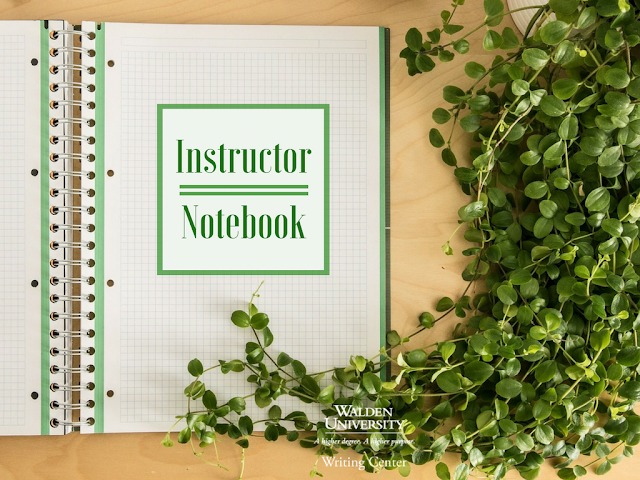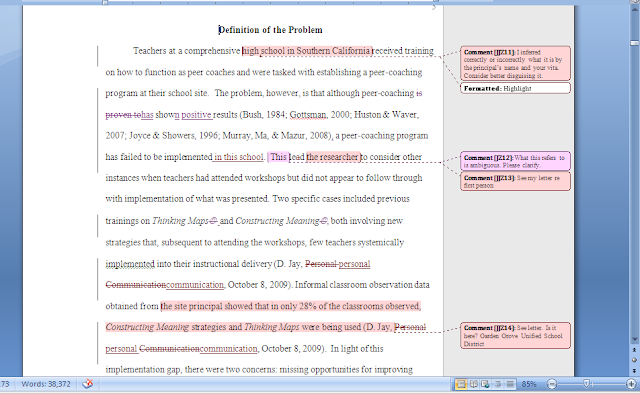Instructor’s Notebook: How I Approach Paper Reviews
Monday, May 29, 2017
Instructor's Notebook
,
Revising
,
Writing Center Services
,
Writing Process
No comments
One of the pedagogical approaches we use during Paper Review
appointments here in the Writing Center is that Instructors don’t comment on
every instance of an issue they identify in a student’s writing. Students sometimes wonder why that is. In today’s
post, I am going to discuss why I don’t comment on every instance of an issue
in a paper review and how this relates to the revision process, information
overload, and helping students with their own revising and proofreading skills.
Writing and writing center pedagogy support the idea of
writing as a process. Writing as a process means a piece of writing undergoes a
series of drafting and revising events. In terms of academic writing, it means
that a strong, well-organized argument from the thesis down to the sentence-level
and everything in between is the result of multiple steps of a process. Therefore, I focus my comments on some, not
all, patterns of error in a paper review to encourage the idea that writing is
a process and requires multiple drafts.
During the drafting process, as students are still
developing their points, there might be several different issues that a student
should address as they revise. However, as an Instructor, I consider where a
student is at and the most pressing writing concerns they might work on for
that particular draft. Since not all concerns are equal within any given writing
project, Instructors must rank them and decide which ones take priority for a
student. The recommendations I make for revising are all part of this drafting
and revising process, a process that is often recursive as a student might revise
the same section multiple times as they develop their argument and
fine-tune their points.
Regardless of my suggestions during a paper review, one of
my overarching goals is to help students understand that revising is a process,
which is part of the reason I don’t comment on every pattern of error in a
paper review.
Information Overload
Another reason I don’t comment on everything in a Paper
Review is because information overload can cloud a student’s comprehension. Information
overload can simply be understood to be given too much information to
effectively process in a given amount of time. Even if it was possible to
process all of the information, the results of the effort would be temporary as
opposed to long-lasting. If I commented on every issue I notice in a Paper Review,
it would lead to information overload because, even if a student was able to
revise based on all of my suggestions, those revisions would likely not be
internalized and transferred to other assignments. Thus, a student would likely
not have gained any lasting writing skills.
Information overload does not lend well to students
developing their own ability to recognize patterns of error and revise their
papers on their own. To be clear, information overload does not provide a
strong basis for recognizing and revising error since it cuts short the
revising process which is essential for developing a strong, well-developed
argument. Therefore, I don’t want to dissuade students from engaging with the
writing process, which can sometimes happen if there is information overload:
yet another reason why I don’t comment on every instance of an issue in a paper.
Revising and Proofreading
Skills
To become strong, independent writers, students to be able
to internalize feedback so they can transfer
writing knowledge from one paper to the next. One method we use to achieve
this goal is helping students learn to revise and proofread on their own. The
more a student is able to work on their papers before and after a paper review,
the more seamless the writing process can become. When students feel more
confident in their ability to revise and proofread, they can feel more
confident in their ability to tackle those longer documents, such as the capstone
project. So, in the end, Writing Instructors want students to develop their own
writing skills so that that process of writing is more pleasant and seamless
for them, and so they are able to express their arguments in ways they feel
confident about. Especially for those final capstone documents and any subsequent
academic publication goals they might have.
Veronica Oliver is a Writing Instructor in the Walden Writing Center. In her spare time she writes fiction, binge watches Netflix, and occasionally makes it to a 6am Bikram Yoga class.
.png)
Never miss a new post; Opt-out at any time
Thursday Thoughts: Capstone Resources
Thursday, May 25, 2017
APA
,
Capstone Writing
,
Concise Writing
,
Digital Research
,
Dissertation
,
Literature Review
,
Organization
,
Revising
,
Scholarly Writing
,
WriteCast
,
Writing Communities
,
Writing Process
No comments
The Writing Center works with Walden
University writers to provide resources for different points in the academic
writing process. Instructors work with students during their coursework and up
through the doctoral prospectus, while editors connect with students from the
proposal stage through the completion of their doctoral project. In addition to
our web resources webinars, and one-to-one services, we provide blog posts,
podcasts, and other resources that may help students with capstone development.
Below is a curated list of resources, by
category, that may be helpful to students as they write the capstone.
On Getting Started
and Sustaining Productivity:
Preproposal Starter Kit
Proposal Starter Kit
Five Things to Know Before Beginning Your Capstone Study
Proposal Starter Kit
Five Things to Know Before Beginning Your Capstone Study
Revising:
Research and
Resources:
Specific
Sections/Documents in the Capstone
 The
Walden Writing Center provides information and assistance to students
with services like live chat, webinars, course visits, paper reviews,
podcasts, modules, and Writing Center webpages. Through these
services they provide students assistance with APA, scholarly writing,
and help students gain skills and confidence to enhance their scholarly
work.
The
Walden Writing Center provides information and assistance to students
with services like live chat, webinars, course visits, paper reviews,
podcasts, modules, and Writing Center webpages. Through these
services they provide students assistance with APA, scholarly writing,
and help students gain skills and confidence to enhance their scholarly
work..png)
Never miss a new post; Opt-out at any time
Introduction to Paper Review Services: Teaching Stronger Writers
Monday, May 22, 2017
News and Notes
,
Revising
,
Writing Center Services
,
Writing Process
No comments
While the Instructors of the Walden Writing Center provide
students with many writing-focused services, our Paper Review service is the
most individualized service offered for students. Paper reviews provide an
opportunity for students to work one-on-one with a professional writing
instructor in order to hone their academic writing skills.
The Goal
Writing Instructors use paper reviews to focus on academic
writing conventions such as APA and citation guidelines (see our APA webpages),
organization and paragraph structure, grammatical patterns (see our grammar and composition webpages), logical connections, transitions, clarity, and precision (see our scholarly writing webpages). The goal of a paper review is to help students not only
build and further develop academic writing skills as they intentionally invest
in the iterative process of drafting and revising, but also to gain a sense of
collaboration in the writing process as they receive another set of eyes on
their work.
In other words, our goal is not to fix papers, proofread,
edit, or provide grade predictions or justifications, but instead to help
students learn how to strengthen their academic writing over time. Paper
reviews are meant to be just one step in the overall writing process.
The Appointment Process
In paper reviews, students sign up for an appointment by navigating
to our myPASS scheduling system (see information on how to make an appointment
on the Paper Reviews webpage). The appointment is slotted for a specific day, but the
times given are for organizational purposes only; the appointment is
asynchronous. This means students do not need to be on the phone or on the
computer for their appointment. Instead, they fill out an appointment form to
provide information to their Writing Instructor, and then attach a document by
5am ET the day of their appointment. Writing Instructors then review their work on
that day of the appointment or on the day after. Writing Instructors use their
allotted time to note patterns in the students’ writing that, when addressed, can
improve students’ academic writing skills or clarity in communication.
While Writing Instructors may notice lots of different
patterns or areas for revision, they work to focus their comments on only the most
relevant ones in order to provide students with clear steps for revision.
Instructors may choose to skip over some proofreading (“lower order”) errors
they notice in order to focus more attention on areas of “higher order” concerns—writing
patterns that impact the clarity of students’ communication. For example, if a student could use
instruction in organizing information, creating a strong thesis statement, and
how to use commas, the writing instructor may focus the review on organization
and the thesis, and not comment much or at all on comma usage.
Because they are limited to only 30
minutes/student, Writing Instructors work to provide students with the feedback
that will most benefit them as students continue to build and hone their
academic writing skills.
Once a Writing Instructor has completed a review, he or she
will then attach the reviewed paper to the student’s appointment form and the
student will receive an e-mail letting them know their review is ready in the myPASS
system. Students can then access their reviewed document at any time, and go
back to previous appointments as well within the system.
For the Next Review…
The final component of a paper review appointment is that
the Writing Instructors encourage the implementation of feedback and revision
between appointments. For example, if a Writing Instructor comments on in-text
citations in one draft, the expectation is that if the student makes another
appointment later in that week or the next week, the student has considered the
feedback about in-text citations and done his/her best to apply those
guidelines to the next document they submit for a review.
Writing Instructors
request that students use feedback to make revisions between appointments
because it helps students in developing their academic writing skills, which is
something that takes both time and practice.
Check out some sample paper reviews, take a look through our appointment guidelines, and schedule an appointment to try it out if you’re
interested. We look forward to reviewing your work soon!
Rachel Willard is the Manager of Writing Instructors in the Walden University Writing Center. She loves hearing others' stories. She enjoys people-watching at airports and shopping places that use the grammatically correct "10 items or fewer" signs for the express checkout lanes.
.png)
Never miss a new post; Opt-out at any time
Writing Center Resource: Paper Reviews!
Thursday, May 18, 2017
APA
,
Capstone Writing
,
Citations
,
Concise Writing
,
Grammar and Mechanics
,
Organization
,
Paragraphs
,
Reading & Writing
,
Revising
,
Scholarly Writing
,
Writing Center Services
,
Writing Process
No comments
Some of you may be familiar with the Writing Center’s paper
review service—maybe you use it often, perhaps you’ve heard of us
but never made an appointment, or maybe this resource is news to you! Regardless
of where you fall along this spectrum, we’re here today to remind you of what
paper reviews can do for you—even during a term break!
Paper reviews are asynchronous one-on-one reviews of your
coursework with a Writing Center writing instructor. Here are the steps to get started!:
- Sign up for an account in myPASS (my Paper Appointment Scheduling System).
- Make an appointment up to two weeks in advance with a writing instructor.
- Attach your paper in myPASS by 5 a.m. EST the day of the appointment (you’ll even receive a reminder email two days before).
Once you’ve attached your paper, sit back and relax! A writing instructor will read through your work and return it with helpful, supportive comments the day of your appointment or the day after your appointment. Your writing instructor will provide you advice on patterns in your writing, use specific examples from your work, and share resources to assist you as you hone your academic writing skills on everything from synthesis to citing.
How can you use this service during a term break? You are
more than welcome to submit work that you’ve already turned in! Make an
appointment for during the break, and let the writing instructor know in your
appointment form that you’ve already submitted the paper and are looking for help
on observing patterns in your work and learning some tools to assist you. You
can even revise that old paper to see if you’re understanding the feedback and are
able to implement it—then submit it for another review.
Term breaks are also great times to reserve two appointments
per week to get feedback on revisions you're making to longer-term writing
projects, like a doctoral premise or prospectus.
Making a paper review appointment during a term break is a
great way to hone your writing skills in a less time-sensitive environment than
during course time, while still continuing to advance your work and keep your
mind engaged in academic writing.
 The
Walden Writing Center provides information and assistance to students
with services like live chat, webinars, course visits, paper reviews,
podcasts, modules, and Writing Center webpages. Through these
services they provide students assistance with APA, scholarly writing,
and help students gain skills and confidence to enhance their scholarly
work.
The
Walden Writing Center provides information and assistance to students
with services like live chat, webinars, course visits, paper reviews,
podcasts, modules, and Writing Center webpages. Through these
services they provide students assistance with APA, scholarly writing,
and help students gain skills and confidence to enhance their scholarly
work..png)
Never miss a new post; Opt-out at any time
Introduction to the Doctoral Form and Style: The Process and Outcomes
Monday, May 15, 2017
Capstone Writing
,
Dissertation
,
Revising
,
Writing Center Services
,
Writing Process
,
writing style
2 comments
Editing is one of the ways in which the Walden University Writing Center collaborates with students in their work during the Capstone process. The main function of the editors is to conduct the Form and Style Review, which occurs at the end of the dissertation or doctoral study process, after the initial committee approval and before the final oral presentation.
The goal for the Form and Style Edit can be described as two-fold. First, the editing process ensures that final manuscripts are APA compliant, and second, editors help students to polish the final product for ProQuest submission. Edits are also conducted with an additional emphasis on flow, cohesion, tone, voice, grammar, and American Academic English. The mission of the Walden Editors is to edit capstone manuscripts for ultimate ProQuest publication, in a supportive and nonjudgmental way, by applying their expertise in APA style, grammar, and the nuance of academic language. This is a collaborative and supportive process where editors help students to create the best, finished product possible.
Process
Once the student has completed writing the final study, meeting each of the document expectations, and the committee and URR have marked the document as met in MyDr, the document is passed to the Form and Style Editors. There are many considerations for the timing and process of the review, but basically, Editors have 14 days to conduct their review and will alert students and the committee, via e-mail, once they have begun working on the document. Again, editors focus on the main elements of APA Style as well as document formatting, grammar, and other aspects of scholarly writing and cohesion and flow. Editors generally mark three types of changes using the MS Word Track Changes Function:
- Required changes such as APA, grammar, writing, or formatting.
- Changes that are strongly recommended such as adding citations for information presented or revising language for clarity.
- Changes that would improve the overall quality of the published document such as moving discussions to other points in the document or revising headings.
Outcomes and the Finished Product
When the review is complete, the editor will return the document in MyDr and alert the student and committee that the review is accessible. In MyDr, Form and Style Editors will include a note detailing the documents attached and general instructions or tips for incorporating feedback and submitting a final, polished study to the committee.
Students will receive two documents via MyDr: a query letter and the marked document. In the query letter, the editor will explain the general types of changes that were made and where, describing the main APA Style or writing changes made during the review. This letter will also contain suggestions from the editor on areas where the student can focus attention during the revising process. The editor will also explain any other changes that should be made before the final document is submitted to the committee. The letter will also contain a tailored version of the Form and Style Checklist, highlighting areas for improvement links to resources that can help students in the process.
The second document students will find in MyDR is the marked document itself. Editors will use Track Changes to edit the document and provide explanations and comments in comment bubbles along the right-hand margin. Here is a sample screenshot of what a typical edit looks like after the Form and Style Review:
Once an editor has marked the document met in MyDr, the Form and Style Review is complete and the student/committee may move on to scheduling the Final Oral Presentation. Editors do not see the document again. The changes and comments are for the student and committee to review and incorporate as final revisions are made, keeping in mind the three types of changes that editors will be including. Editors are available for any questions about the review in general, or comments or changes made during the review. Check out the Walden University Form and Style Website for additional information and resources on editing at Walden and the Form and Style Review.
Kelly Chermack is the Manager of Editing Services in the Walden University Writing Center. She first joined the staff as a dissertation editor in 2012. She earned her PhD from the University of Minnesota in Sociology, and specializes in organization theory, workplace policy, and research methods. She is also a contributing faculty member in Walden's Human and Social Services PhD and Doctorate of Business Administration.
.png)
Never miss a new post; Opt-out at any time
WriteCast Episode 38: The Literature Review Matrix: What it is, How to Use it, and How to Make it Work for You
Thursday, May 11, 2017
APA
,
Capstone Writing
,
Citations
,
Digital Research
,
Dissertation
,
Literature Review
,
podcast
,
Prewriting
,
Scholarly Writing
,
WriteCast
,
Writing Process
2 comments
Have you heard of the literature review matrix? It's a tool you'll want to know about if you're working on, or going to be working on, any major research and writing project. If you are familiar with the matrix but aren't yet sure how to use it or haven't found it helpful, then this episode is for you, too. Brittany shares why she loves the matrix as a researching, writing, and teaching tool, and Beth explains why she was hesitant about the matrix at first but how students can tailor it to meet their own research needs.The Literature Review Matrix resource, the focus of this episode, is available in Word and PDF form on our website!
Click on the player below to listen to the full episode now. To download the episode, click the share button on the player, then click the download button. If you'd like a transcript of today's episode, or to access our episode archive, head over to our WriteCast: A Casual Conversation for Serious Writers homepage. Happy Listening!
.png)
.png)
Never miss a new post; Opt-out at any time
Subscribe to:
Comments
(
Atom
)







.png)



No comments :
Post a Comment